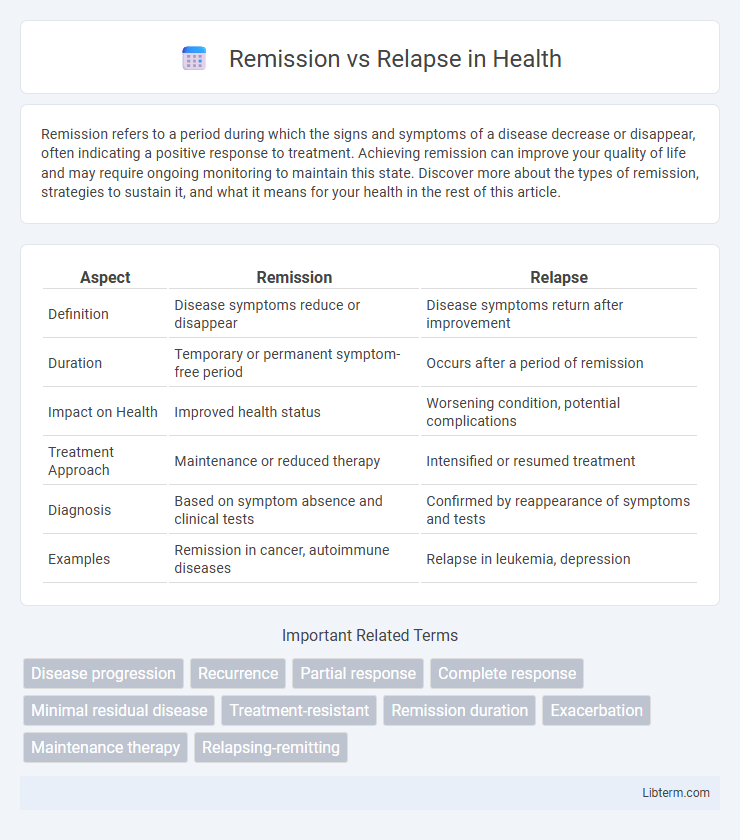Remission refers to a period during which the signs and symptoms of a disease decrease or disappear, often indicating a positive response to treatment. Achieving remission can improve your quality of life and may require ongoing monitoring to maintain this state. Discover more about the types of remission, strategies to sustain it, and what it means for your health in the rest of this article.
Table of Comparison
| Aspect | Remission | Relapse |
|---|---|---|
| Definition | Disease symptoms reduce or disappear | Disease symptoms return after improvement |
| Duration | Temporary or permanent symptom-free period | Occurs after a period of remission |
| Impact on Health | Improved health status | Worsening condition, potential complications |
| Treatment Approach | Maintenance or reduced therapy | Intensified or resumed treatment |
| Diagnosis | Based on symptom absence and clinical tests | Confirmed by reappearance of symptoms and tests |
| Examples | Remission in cancer, autoimmune diseases | Relapse in leukemia, depression |
Understanding Remission and Relapse
Remission refers to a period during which symptoms of a disease, such as cancer or mental illness, decrease significantly or disappear, indicating effective treatment or disease control. Relapse is the return of symptoms or disease activity after a period of remission, often requiring renewed medical intervention or therapy adjustments. Understanding the differences between remission and relapse is crucial for monitoring patient progress, guiding treatment plans, and improving long-term outcomes.
Definitions: What is Remission?
Remission refers to a period during which the signs and symptoms of a disease, such as cancer or chronic illness, are reduced or disappear completely, indicating an improvement in the patient's condition. It can be classified as complete remission, where no evidence of disease is detected, or partial remission, where some symptoms persist but are significantly diminished. Achieving remission is a critical goal in treatment, as it signifies a temporary or permanent halt in disease progression.
Definitions: What is Relapse?
Relapse refers to the return or worsening of disease symptoms after a period of improvement or remission, commonly seen in chronic conditions like cancer, mental health disorders, or autoimmune diseases. It indicates that the illness is active again, often requiring renewed or intensified treatment strategies. Understanding relapse is crucial for monitoring patient progress and adjusting therapeutic approaches to prevent further complications.
Key Differences Between Remission and Relapse
Remission refers to a period when symptoms of a disease, such as cancer or chronic illness, significantly decrease or disappear, indicating effective disease control. Relapse occurs when symptoms return or worsen after a phase of improvement or remission, signaling the disease's progression or recurrence. The key difference lies in remission representing disease inactivity or control, while relapse indicates disease re-emergence or escalation.
Causes Leading to Remission
Remission occurs when symptoms of a disease, such as cancer or autoimmune disorders, decrease or disappear due to effective treatment or the body's immune response. Key causes leading to remission include targeted therapies that disrupt disease pathways, early diagnosis enabling prompt intervention, and lifestyle changes that enhance overall health. Understanding genetic factors and immune system function also plays a crucial role in predicting and achieving remission.
Factors Triggering Relapse
Factors triggering relapse in chronic illnesses include stress, poor medication adherence, and underlying untreated conditions such as infections or autoimmune flare-ups. Environmental exposures, lifestyle changes, and psychological factors like anxiety can also precipitate relapse episodes. Monitoring these triggers is crucial for maintaining remission and preventing disease recurrence.
Early Signs and Symptoms of Relapse
Early signs and symptoms of relapse often include subtle mood changes, increased anxiety, and difficulty concentrating, which signal a departure from remission stability. Physical symptoms such as fatigue, sleep disturbances, and appetite changes frequently accompany psychological shifts during the relapse phase. Monitoring these early indicators is crucial for prompt intervention to prevent full relapse and maintain long-term remission in chronic conditions.
Monitoring and Managing Remission
Effective monitoring of remission in chronic illnesses involves regular clinical evaluations, laboratory tests, and imaging studies to detect early signs of relapse. Managing remission requires personalized treatment plans, including maintenance therapy and lifestyle adjustments, to sustain disease control and improve patient outcomes. Prompt identification and intervention during remission can prevent relapse, reducing long-term complications and healthcare costs.
Strategies to Prevent Relapse
Effective strategies to prevent relapse in chronic conditions include maintaining consistent medication adherence, participating in ongoing therapy or support groups, and implementing lifestyle changes such as stress management, regular exercise, and balanced nutrition. Monitoring early warning signs and having a personalized action plan with healthcare providers can significantly reduce the risk of relapse. Utilizing cognitive-behavioral techniques and fostering strong social support networks also play crucial roles in sustaining remission.
Support Systems for Patients in Remission and Relapse
Support systems for patients in remission and relapse play a crucial role in managing emotional well-being and enhancing recovery outcomes. During remission, consistent support from healthcare providers, family, and peer groups fosters resilience and encourages adherence to maintenance therapies. In relapse, specialized counseling, support groups, and immediate medical interventions provide critical assistance in coping with setbacks and planning effective treatment adjustments.
Remission Infographic

 libterm.com
libterm.com